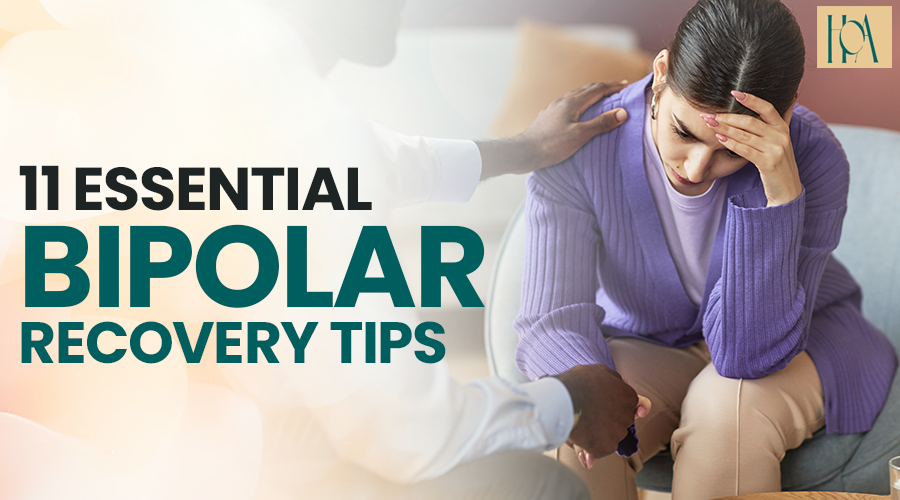Bipolar disorder can feel like an emotional rollercoaster, but recovery is possible. While it may not be permanently curable, individuals can achieve stability, significantly reduce the frequency and intensity of mood swings, and improve their overall quality of life. With the right techniques, support, and mindset, this lifelong condition can be effectively managed. If you’re seeking help, exploring options for Bipolar Disorder Treatment in Delhi alongside these 11 essential bipolar recovery tips can guide you toward long-term mental wellness.
Whether you’re newly diagnosed or looking to refine your coping strategies, these 11 essential bipolar recovery tips offer practical and actionable steps that truly make a difference in day-to-day life.
Let’s explore 11 essential bipolar recovery tips to effectively manage this condition
- Follow your treatment plan strictly –
The foundation of bipolar recovery lies in consistency. This includes taking prescribed medications on time, attending therapy sessions, and following any other recommendations made by your mental health professional. It might be tempting to stop treatment during periods of stability, but this can lead to relapses. Mood stabilizers, antipsychotics, or antidepressants are often necessary to keep your mood balanced. You can use clock app for setting reminders for medicines or appointments and even use a pill organiser.
- Gather knowledge about bipolar disorder –
Having a deeper insight of your condition is extremely helpful for its effective management. If you thoroughly understand this condition, its symptoms, triggers etc., it becomes easy to deal with it. For more information, read a book, watch an online video, join workshops or consult your trusted medical professional. End your day by journaling about your day and recording your emotions and also know your triggers behind mental instability.
- Create a support system –
Isolation can worsen bipolar symptoms. Building a solid support system of friends, family, support groups, or therapists provides emotional safety and practical help. When you’re going through a tough time, having people who understand what you’re facing can make a world of difference.Join a local or online bipolar support group where you can share experiences and get advice from others who truly understand.
- Stress management is crucial –
Developing a toolbox of coping strategies like deep breathing, meditation, yoga, journaling, or creative expression can help you manage stress before it escalates. As part of the 11 essential bipolar recovery tips, stress management plays a vital role in preventing relapses. Daily practice of 10–15 minutes of mindfulness meditation works wonders.
Also Read:- OCD Treatment Psychiatrist GK
- Practice sleep hygiene –
Sleep has a major impact on mood stability in bipolar disorder. Both insomnia and oversleeping can trigger mood episodes. Establish a consistent sleep schedule—go to bed and wake up at the same time daily, even on weekends. Avoid stimulants like caffeine late in the day and keep screens away before bedtime. Finding it hard to sleep? Take the opinion of your doctor if medical address is needed.
- Practice good lifestyle practices –
Stability thrives on routine. Eat nutritious meals, exercise regularly, and stay hydrated. These lifestyle habits support physical health, which is closely linked to mental well-being. Avoid alcohol and recreational drugs—they can disrupt your mood and interact dangerously with medications. Pick one healthy habit at a time and begin practicing it such as walking for 20 minutes a day etc. and then gradually add more habits.
- Know early warning signs –
Learning to identify your personal early warning signs of a manic or depressive episode can help you take action before things escalate. This might include changes in sleep patterns, spending habits, or energy levels. Once you notice signs, reach out to your support system or provider immediately. Make a list of the signs you are observing and share them with your trustworthy family members or friends to look out for the changes.
Also Read:- Best Psychiatrist in South Delhi
- Stay in touch with your doctor –
Mental health care is not a one-time fix—it requires ongoing attention. Even when you’re feeling stable, regular check-ins with your psychiatrist or therapist are essential. They can help monitor medication side effects, assess your mental state, and make adjustments as needed. Crisis is not the right time to consult your doctor, rather regular appointments every few weeks or months is considerable depending upon your condition.
- Refrain from any significant life change during an unstable phase –
This condition can shift your perception during the episode. So avoid taking any major decision during this time such as changing jobs, doing a breakup, fighting with friends etc, as you may regret it later. Try postponing the decisions until your mind is stable and clear.
- Engage in useful activities –
The recovery phase should include something you find your inner soul connecting with. It can be pursuing your favourite hobby such as dancing, yoga, gardening etc, or doing anything that brings you happiness. It is great for motivation and remaining connected with the world at your own pace. Involve in small activities such as painting, reading a book or anything to help you recover from a depressive state of mind. When you add purpose in your life, quality of life improves and you gain satisfaction. This step is one of the 11 essential bipolar recovery tips that encourages emotional balance through purposeful engagement.
- Patience and being kind is key –
Recovery is an ongoing process and not a straight line. You will get obstacles on your journey and that is completely ok. Be patient and gentle with yourself as being compassionate will make your recovery better. Celebrate your small victories as may the progress be slow, you are still recovering. Make self-affirmation statements such as ‘I am doing the best as per my capacity’, ‘I can achieve everything I dream of and work for, etc. to encourage yourself.
Conclusion –
Bipolar disorder, though challenging, can be managed successfully with commitment, education, and the right support. By following these 11 essential bipolar recovery tips, individuals can take meaningful steps toward emotional stability and a better quality of life. At HOA, under the expert guidance of Dr. Ashish Bansal, we offer comprehensive care and personalized Bipolar Disorder Treatment in GK to support your journey to recovery. Be kind to yourself, take it one day at a time, and never hesitate to seek professional help when needed.





